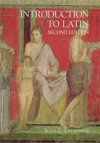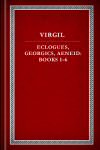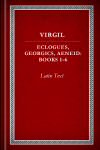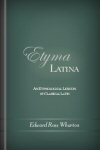Introduction to Virgil’s Aeneid (6 vols.)
Digital Logos Edition
Overview
Experience Rome’s greatest poet through the elegance of Virgil’s original Latin with the Noet Introduction to Virgil. This collection is perfect for both students and enthusiasts interested in reading Virgil for the first time. In addition to the Loeb Classical Library editions of Virgil’s three major works and the Appendix Virgiliana, this collection includes Susan C. Shelmerdine’s Introduction to Latin—a comprehensive introduction to reading Latin designed to kick-start comprehension of the text through frequent readings of actual classical Latin writings. Lastly, Edward Ross Wharton’s Etyma Latina provides a vocabulary foundation in 3,055 words from which most all other classical Latin words are built.
Perhaps Rome’s greatest poet, Virgil composed three major works of Latin literature: Ecloguese, Georgics, and the Aeneid. His work is some of the most structurally complex and flawlessly executed poetry produced in any language at any time. For centuries, the Aeneid and his other major works have been perennially standard curriculum in Western education. This capstone of literary accomplishment is now more accessible than ever.

- Equips classical enthusiasts to read Virgil in the original Latin
- Provides a contemporary Latin language textbook and basic lexicon designed for reading classical Latin
- Includes Virgil’s Ecloguese, Georgics, Appendix Vergiliana, and the Aeneid in the Loeb Classical Library editions
The Introduction Series equips beginners to engage the likes of Plato, Homer, and Virgil in the original Greek and Latin. Each collection contains authoritative editions of the original language manuscript with an English translation, and a contemporary Greek/Latin language textbook as well as a basic lexicon, selected to fit the text at hand. It has never been easier for lovers of the classics to study these texts in their original language. Start using Logos, and discover the classics with the eyes of an expert.
- Title: Introduction to Virgil’s Aeneid
- Volumes: 6
- Pages: 1,720
- Resource Type: Literature
- Topic: Classical Latin/Roman Literature
- Introduction to Latin, 2nd ed. by Susan Shelmerdine
- Eclogues, Georgics, Aeneid: Books 1–6 translated by H. Rushton Fairclough
- Eclogues, Georgics, Aeneid: Books 1–6: Latin Text by Virgil
- Aeneid: Books 7–12, Appendix Vergiliana translated by H. Rushton Fairclough
- Aeneid: Books 7–12, Appendix Vergiliana: Latin Text by Virgil
- Etyma Latina: An Etymological Lexicon of Classical Latin by Edward Ross Wharton

Introduction to Latin is a complete introductory Latin text specifically designed as a core text for a full year of college course work. The text is designed as a streamlined and uncluttered approach to Latin and grammar, providing a complete course without hindering the first year student’s mastery of the material. It covers all aspects of Latin grammar in a familiar pedagogical flow, with English grammar explained as needed, providing students with an in-text reference point for new Latin material. Latin readings occur throughout the text, early and often, in the form of sentences and short passages. They are unconnected, providing the instructor the option of covering them as time and need allows. This text also includes a variety of exercises that provide different approaches to mastery of the language, especially in the early chapters.
Shelmerdine has greatly improved an already excellent book . . . I have always liked the way she explains concepts, such as sentence patterns, subordinate clauses, correlating conjunctions, etc., that other books take for granted . . . [T]he book discusses the structure of the Latin sentence as a whole before breaking it down into its individual parts, allowing the students (and the teachers!) to really understand how the Romans put words together.
—Thomas Kohn, associate professor of classics, Wayne State University
A concise, no-nonsense approach that isn’t ‘over-scripted.’ Shelmerdine allows the instructor scope for real teaching and meaningful interaction with students.
—Peter O’Brien, assistant professor of Latin literature, Dalhousie University
Susan Shelmerdine is professor in the department of classical studies at the University of North Carolina, Greensboro. She is also the author of Homeric Hymns.

Eclogues, Georgics, Aeneid: Books 1–6
- Author: Virgil
- Translator: H. Rushton Fairclough
- Series: Loeb Classical Library
- Publisher: Harvard University Press
- Publication Date: 1916
- Pages: 304
This volume contains H. Rushton Fairclough’s English translation of Eclogues, Georgics, and books 1–6 of the Aeneid.

Eclogues, Georgics, Aeneid: Books 1–6: Latin Text
- Author: Virgil
- Series: Loeb Classical Library
- Publisher: Harvard University Press
- Publication Date: 1916
- Pages: 304
This volume contains the Latin text of Eclogues, Georgics, and books 1–6 of the Aeneid.

Aeneid: Books 7–12, Appendix Vergiliana
- Author: Virgil
- Translator: H. Rushton Fairclough
- Series: Loeb Classical Library
- Publisher: Harvard University Press
- Publication Date: 1918
- Pages: 304
This volume contains H. Rushton Fairclough’s English translation of books 7–12 of the Aeneid and Appendix Vergiliana.

Aeneid: Books 7–12, Appendix Vergiliana: Latin Text
- Author: Virgil
- Series: Loeb Classical Library
- Publisher: Harvard University Press
- Publication Date: 1918
- Pages: 304
This volume contains the Latin text of books 7–12 of the Aeneid and Appendix Vergiliana.

Edward Ross Wharton found that the writers of the classical period of Latin literature, down to the death of Trajan in AD 117, used 26,326 words (excluding proper names), all of which except 4,320 sufficiently explain their own formation—thus are derivatives or compounds of these 4,320 words. In Etyma Latina: An Etymological Lexicon of Classical Latin, Wharton treats 3,055 of these 4,320 words, being those found in the 16 Latin authors of the first rank: Plautus, Terence, Cicero, Caesar, Catullus, Lucretius, Sallust, Vergil, Horace, Livy, Tibullus, Propertius, Ovid, Persius, Tactitus, and Juvenal. Setting aside some 380 words of obscure origin which cannot as yet be classified, these 3,055 words fall into the following three classes:
- I. Inherited words: having cognates on other Indo-Celtic languages
- II. Manufactured words: derivatives or compounds of the words in class I
- III. Imported words: borrowed from Greek or other languages
Susan Shelmerdine is professor in the department of classical studies at the University of North Carolina, Greensboro. She is also the author of Homeric Hymns.
Publius Vergilius Maro or Virgil (70–19 BC) was born, according to tradition, in Andes, Gaul. He was educated at schools in Cremona, Mediolanum, Rome, and Naples. Virgil died after visiting Greece to revise the Aeneid. Though Virgil wished to have the poem burned, Augustus ordered that it be printed after his death.